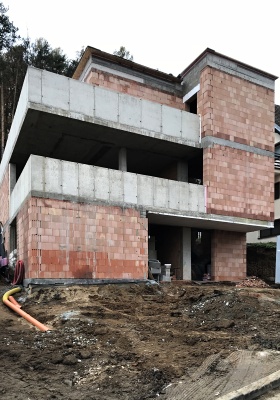
November's higher apartment construction does not mean greater housing availability
 |
According to the ČSÚ, new apartment construction in November increased year-on-year by more than three-fifths to 3,600. However, 2,282 apartments were completed, which is nearly two-fifths less compared to the same month in 2023.
"In the first 11 months of last year, 33,487 new apartments were started in the Czech Republic. This is indeed an increase of 2.9 percent year-on-year, but the year 2023 was marked by many developers slowing down construction due to the significant decline in interest in apartments caused by high mortgage rates. For example, compared to the first eleven months of the pre-pandemic year 2019, the number of started apartments last year was nearly five percent lower," said the economist of Komerční banka Martin Gürtler.
Economist from Banka Creditas Petr Dufek believes that the initiation of many projects in one month may also mean that the following months will be weaker for further construction. A significant share of the new construction comes from projects in the capital city, where, according to him, the demand for apartments is traditionally the highest, as are the prices. "Prague alone accounted for more than half of the year-on-year increase in residential construction, followed by the South Moravian Region, specifically Brno, with nearly a third. In any case, this could be the long-awaited rebound of apartment construction from the bottom, which is, however, very deep," Dufek added.
Gürtler also warned that the number of building permits issued in November decreased month-on-month by 12.3 percent and year-on-year by 12.5 percent. The November figure of 5,338 building permits was not only the lowest figure for the last year but also the lowest in approximately the last nine years. The only lower figure during this time was in January 2016 when 5,325 permits were issued.
"This is significantly below the average for the post-pandemic period, when in the years 2020 to 2024, building authorities issued an average of just under 7,000 building permits per month. In the first decade of the 21st century, this number often exceeded the threshold of 10,000. The long-term negative trend regarding the number of permitted constructions was likely exacerbated in November last year by problems associated with the digitalization of the building process. It is possible that these will affect the statistics with a delay," Gürtler added.
Building production in the Czech Republic, according to the ČSÚ, rose year-on-year by 2.5 percent last November after three months of decline. The increase was positively influenced, among other things, by the low comparative base from November 2023, which was rich in precipitation. In civil engineering, i.e., building constructions, production was higher by 1.9 percent compared to November 2023.
The English translation is powered by AI tool. Switch to Czech to view the original text source.
0 comments
add comment
Related articles
0
11.01.2026 | The disadvantage of investing in residential real estate has further deepened
0
14.08.2025 | <div>Chamber: The availability of housing would be increased by modular and prefabricated construction</div>
0
27.07.2025 | <p>Experts: The yield from purchasing an apartment ranges from four to ten percent per year.</p>
0
26.12.2024 | In 2025, the demand for real estate will rise again, which will drive up prices
0
06.09.2024 | To purchase an average-sized apartment in the Czech Republic, five annual household incomes are needed
0
30.04.2021 | The average price per square meter in a new apartment in Brno has exceeded 100,000 CZK
0
14.10.2013 | Czechs are buying smaller apartments more often; instead of living in them, they want to rent them out








